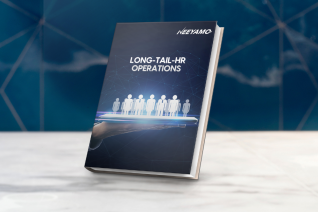Establish your presence globally with Neeyamo as we help you go beyond borders to manage your international payroll and hire new talent in Iraq.
Overview
Did you know that in the bustling heart of ancient Mesopotamia, modern-day Iraq, a groundbreaking discovery was made around 3400 BC? It unveiled a world-changing innovation—the birth of written language. Imagine clay tablets etched with the earliest known texts, not just as an artistic expression but as a practical tool for managing the affairs of a burgeoning civilization. These remarkable artifacts symbolize an incredible stride in human progress, forever transforming how we document and communicate our thoughts and deeds.
Does your organization's expansion plans require you to hire employees in a country steeped in history and renowned for its skilled workforce? Do you lack a physical entity in the country – a key requisite to hire local talent? Neeyamo – one of the top Global payroll providers, assists organizations worldwide with onboarding and managing employees in Iraq- processing payroll, managing local compliance requirements, benefits, and more.
Tools And Instances
Facts And Stats
Capital
Baghdad
Currency
Iraqi Dinar
Official Language
Arabic and Kurdish
Fiscal Year
1 January - 31 December
Date Format
DD/MM/YYYY
Country Calling Code
964
Time Zone
Arabia Standard Time (UTC+03:00)
Global Payroll
Overview
What is Global Payroll?
Handling payroll for a widespread workforce can pose a significant challenge for any organization, and the added complication of compliance can make things worse. If companies spend more time processing payroll, it directly impacts day-to-day operations and their overall productivity. The solution to this is global payroll outsourcing.
What is a global payroll system?
Over the years, Neeyamo – Global Payroll Services, being one of the top global payroll providers, has observed these complexities and strived to provide global payroll solutions through a single technology platform – Neeyamo Payroll. Neeyamos global payroll systems ease the process for companies looking to outsource their global payroll requirements and aid them in maneuvering the tricky payroll system in Iraq. Neeyamos payroll software provides the perfect solution for all your global payroll needs – for employees working in primary geographies, the long-tail region, remote or internationally located.
How is payroll calculated?
Neeyamo acts as your personalized Payroll Calculator. Ensuring adherence to local regulatory requirements using multi-level controls. Providing timely and accurate payroll, courtesy of our experts worldwide and using a tech-based integrated smart helpdesk solution with seamless support experience manned by payroll experts - Neeyamo has all your payroll needs covered.
Payroll Taxes
Payroll tax is the percentage amount retained from an employee's salary and paid to the government to invest in the general population's welfare. These are statutory in nature and are levied from both the employer and employee. Additional statutory contributions are made by employers towards providing both short-term and long-term benefits for their employees.
Employee Taxes
Employee Payroll Contribution - 5% - Social Security
Income Tax Rate:
- 3% - Up to 250,000
- 5% - More than 250,000 and up to 500,000
- 10% - More than 500,000 and up to 1 million
Employer Taxes
Employer contribution is as follows:
- 1% - Health Insurance
- 3% - Work Accidents
- 9% - Pension
- 12% - Total Employment Cost
Payroll Cycle
Overview
Undoubtedly, payroll is a critical process for any organization. The pay cycle in Iraq refers to the period for which an organization pays its employees, and this can vary depending on the pay frequency that the organization chooses to adopt.
Frequency
In Iraq, employees get paid on a monthly basis.
13th Month Cycle
13th and 14th month salaries are not a statutory requirement.
Global Work
Overview
Employer of Record / EOR: Meaning
An Employer of Record / EOR services provider helps you eliminate the hassle of handling complexities while onboarding a new employee in an international location. They help bridge the gap that otherwise mandates organizations to have a local registered entity and a local bank account, prior to making a job offer to an international hire.
An Employer of Record / EOR services provider acts as a legal employer, facilitates salary payments, and manages other statutory requirements such as health insurance, payroll taxes, and employee benefits ensuring compliance with local tax laws and regulations.
This allows organizations to focus on collaborating with the employee in Iraq for operational tasks, with the knowledge that they have a cost-effective solution, such as Neeyamos – one of the best employer of record companies, to support their global payroll management & HR requirements as they continue their global expansion.
HR Mandates and Practices
Minimum Wage
The minimum wage in Iraq is IQD 350,000 (approximately $293.29).
Overtime
Overtime is generally limited to four hours per day for non-industrial work or one hour per day for industrial work, subject to maximums of 40 hours in a 90-day period and 120 hours in a one-year period.
Overtime worked during a normal working day (work performed beyond eight hours) is to be remunerated at one and a half times the normal rate of pay. Work done at night, on a weekly rest day, or on a holiday must be remunerated at twice the amount of normal pay. Employees working on a rest day or a holiday are to be given another rest day during the week to replace it.
Data Retention Policy
Tax records must generally be kept for a minimum of five years. Employment records regarding workers' wages, deductions, and overtime must be maintained; however, no guidance is provided on the length of time such records must be kept.
All documents must be kept in Arabic except in the region of Kurdistan, where documents can be kept in Kurdish languages.
Hiring and Onboarding Requirements
Hiring
Both Law 37/2015 (the Iraqi Labour Law, which governs employment relationships in most of Iraq) and Law 71/1987 (the Kurdish Labour Law, which regulates employment relationships in the semi-autonomous Kurdistan Region (comprising the Duhok, Erbil, and Sulaymaniyah provinces)) establish a system for hiring workers.
Prospective employers must notify their local employment office of a vacancy. The employer may hire any individual if the employment office does not locate a viable candidate. Employers may publicly advertise a position in Iraq only after engaging the employment office and receiving a negative or no response.
Employers must be mindful of this distinction during the hiring process in order to ensure that foreign workers have obtained proper documentation, such as work and residency permits. The legal definition of a ‘worker’ encompasses local and foreign workers and the law requires employers to treat workers equally. To this extent, most rules concerning employment relationships – including with regard to sick and annual leave, working hours, and termination – are the same for both foreign and Iraqi workers.
Onboarding
Any new employee should provide the following information:
- Name
- Current and Permanent address
- Nationality Identification
- Identification number - Iraq national ID card
- Contact number
- Copy of passport
- Work permit (for ex-pats)
- Driving Licence
Probation
As long as the contract of employment is so specified, a worker may be subject to a trial period of a maximum of 3 months in order to test his occupational skills, good conduct, and assiduousness at work.
Leave
National Holidays
Public Holiday
Iraq recognizes the following public holidays:
- January 1: New Year's Day
- January 6: Iraqi Army Day
- March 21: Festival of Spring
- April 21: Eid al-Fitr
- May 1: Labor Day
- June 27 – Jul 1: Eid al-Adha
- July 14: Republic Day
- July 19: Islamic New Year
- September 26: Mawlid al-Nabi
- October 3: Sovereignty Day
- December 25: Christmas
Sick Leave
Employers must reimburse employees for the number of days an employee misses due to sickness, but only after an employee obtains a medical certificate for sick leave which includes the number of days of sick leave that can be taken according to a physician. Employers must reimburse employees for the number of days the physician has noted up to a maximum of eight days at one time. Employers must reimburse employees for up to 30 days of paid sick leave in a year, and after 30 days, Social Security covers sick pay.
Maternity Leave
Female employees are entitled to up to 14 weeks of maternity leave, of which six weeks must be after the female employee has given birth. This time period can be extended for multiple births or difficult births up to a total period of nine months. Employers must remunerate employees with full pay during the normal allowed period of maternity leave. Extra leave taken will be remunerated as sick leave. Nursing mothers are entitled to a paid break of an hour each day.
Paternity Leave
The Labor Law does not grant fathers paternity leave. Any parent (male or female) is entitled to unpaid leave for up to three days to tend to a sick child under six years of age.
Parental Leave
In Iraq, any parent (male or female) is entitled to unpaid leave for up to three days to tend to a sick child under six years of age.
Annual Leave
Employees generally are entitled to 21 days of paid annual leave. Employees working in positions harmful to their health are entitled to 30 days of paid leave annually. The amount of leave an employee is entitled to each year increases by two days after five and after ten years of service, and then by three days for every subsequent five years of service. A worker shall take his annual leave all at one time.
Child Care Leave
Women with one or more children under six years old may take three days of leave without pay to care for a sick child.
Personal Leave
Employees are entitled to five days of paid leave for their marriage, one day of paid leave for the marriage of their child, or five days of paid leave for the death of a parent, spouse, spouse's parent, sibling, or child.
Other Leave
In Iraq, if the employee is involved in some hazardous activity like heavy equipment operation, etc., he will be entitled to 30 days of paid leave.
Termination
Notice Period
Employees generally may terminate a contract with 30 days' notice. If 30 days' notice is not given, the employee owes the employer compensation equal to their salary for the time of notice not given.
Severance Pay
Employees are also generally entitled to severance pay of two weeks of wages for each year of service. If an employee dies, the worker's family is entitled to two months of wages, provided that the employee worked for the employer for at least a year.
Visa
Overview
Foreign workers are required to obtain a visa for foreign nationals before arriving in Iraq to work at an Iraqi Consulate.
Foreign workers must also obtain a work permit, regulated by the Ministry of Labor and Social Affairs, before engaging in employment in Iraq. A multiple entry visa can be applied for once a foreign worker is in Iraq, which is regulated by the Ministry of the Interior in Iraq.
Employee Background Checks
Legal and Background Checks
(a) Criminal records
Employers may review workers’ or potential workers’ criminal records if their request to do so is explicit and agreed upon in the employment contract or pre-employment agreement. The law requires security companies to:
- review a potential worker’s criminal record before hiring them, and
- file a copy of this document with the Ministry of Interior.
(b) Medical history
Employers may review workers’ or potential workers’ criminal records if their request to do so is explicit and agreed upon in the employment contract or pre-employment agreement. The law requires security companies to:
In general, nothing prohibits employers from requesting workers’ or potential workers’ medical histories.
(c) Drug screening
Employee drug use is governed by the Iraqi and Kurdistan Labour Laws only to the extent that it affects workers while they are in the workplace. However, if drug screening is written into an employment or pre-employment agreement, once signed, the worker must abide by it.
(d) Credit checks
Neither the Iraqi nor the Kurdish Labour Laws require employers to conduct credit checks on potential employees. In practice, it is unlikely that banks in Iraq will permit a credit check on an individual.
(e) Immigration status
Both the Iraqi and Kurdish Labour Laws require workers to have the proper documentation, including a work permit, in order to work. Therefore, enquiring about a potential worker’s proof of immigration should be viewed as complying with the law.
(f) Social media
It is uncommon for employers or potential employers to check the social media accounts of workers or potential workers. However, to the extent that this information is public, there should be no limitation on reviewing it. Employers cannot force workers to divulge their social media passwords.
Last updated on September 27, 2023
If you have any queries or suggestions, reach out to us at irene.jones@neeyamo.com








